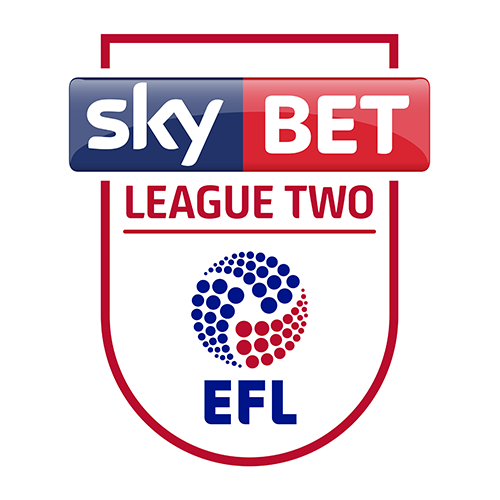Football
League Two Football: End of Term Report

Now that schools have officially broken up for the summer, we thought we’d take a look at this season and give them their end-of-term report and grades. We’re starting with the EFL and building upwards so here’s how League Two clubs have performed this year…
Bradford City: C
Following relegation from League One last season, Bradford City were tipped as nailed-on candidates for an immediate return to the third tier. A club with a rich history, healthy budget and strong fanbase, Stuart McCall’s men got off to a good start to the season. They occupied a spot in the top seven on a consistent basis. Missing out on the play-offs by four points, the Bantams will look to the premature ending to the season as the reason for their shortcomings. Two wins in their last 13 matches didn’t exactly help their cause.
Cambridge United: B-
Never likely to drop, given Stevenage’s terrible campaign and Macclesfield Town’s financial misdemeanours costing them points. Never likely to trouble the play-off places. A run of four consecutive victories in February temporarily lifted Mark Bonner’s side into the top half following Colin Calderwood’s departure. However, defeats to Carlisle United and Leyton Orient while in a congested area of the league table dropped the U’s to 16th position. While season-on-season improvement is always positive, it wouldn’t take a a college degree to hypothesise that Cambridge will most likely occupy mid-table again next season.
Carlisle United: C+
Having made a big push for the play-offs last season but falling short in the final weeks, Carlisle United would have been hoping to go at least one step further this time around. After an awful start to the season resulted in Steven Pressley leaving Brunton Park in November, United only lost five of the 18 matches Chris Beech took charge of. But with so many draws, the Cumbrians could only muster an 18th placed finish. If they maintain such solidity as a foundation for next season, there’s no reason they can’t resurrect a play-off push. As for this season, fans will probably be content with progress from the early stages of this campaign, but no more than that.
Cheltenham Town: B+
With the fewest defeats in the division this season, Cheltenham Town were made to rue the lack of wins compared to the top three. They missed out on automatic promotion and then dropped a two-goal lead on home soil to fall short in the play-offs. Michael Duff’s side had the best defence in League Two this term, shipping just 27 goals in their 36 matches and were evermore efficient as the season went on – one defeat in ten before the curtailment made arguably made them favourites for promotion. Will they be able to repeat this in 2020-21 or will they fall away?
Colchester United: C+
2018-19 saw John McGreal’s side play much of the season in the play-off positions and they almost made it but for an 87th-minute Newport County equaliser at Morecambe; the U’s missing out by a single point. This season saw them into the play-offs by the same margin when the regular campaign was called to a halt. It was the first time in four attempts that they’d reached the season extension after relegation from League One in 2015. Unfortunately for them, they couldn’t hold on to their first-leg advantage over Exeter City, losing 3-1 after extra time at St James Park. They will remain a favourite to reach the same stage next season, but will look at this term as relative failure.
Crawley Town: B-
Having struggled in the previous campaign, it couldn’t get any more mid-table for the reds, with as many defeats suffered as victories earned. With Gabriele Cioffi departing the manager’s role by mutual consent in December, former scout John Yems was handed the reigns and led them to 13th place, or “top of the second page.” Ollie Palmer once again top-scored for Crawley with 13 league goals and with a promising run of just two defeats in 15 matches. They may have realistic ambitions of much bigger things next time out.
Crewe Alexandra: A
Usually when the top two share points tallies, positions are split by goal difference. This season, however, it’s the points-per-game method of settling the season that has prevented Crewe Alexandra being named champions. They scored the most goals, the second-tightest defence and meaningful contributions from all areas on a consistent basis. They continued on from the strong end to last season (six wins in the last nine) and maintained a top-three position for the majority of this campaign. A worthy promoted side, if not necessarily expected.
Exeter City: C
If there was ever a club with a sense of Deja vu, it has to be Exeter City. After strong starts in consecutive seasons, wobbles in form after Christmas have seen them twice slide down the table. This season, however, they did manage to remain in the play-offs and indeed got themselves to Wembley. They will have to go again next season and will remain one of the bookies’ favourites for promotion. But when we consider that Matt Taylor’s side missed out on automatic promotion by three points, having not won any of their final four games, there is a huge sense of shooting themselves in the foot at St James Park.
Forest Green Rovers: D
Mark Cooper has transformed Forest Green since his tenure began at the New Lawn. Back-to-back promotions into League Two was followed by a strong showing last season, falling short in the play-offs. This season looked to be heading the same way, having twice reached the summit of the table but after just two wins since mid-January, fell to 10th place, a full nine points from the play-off positions. Cooper’s side will likely be pushing again next season, but as for this, it is very much a case of what could have been. Again.
Grimsby Town: B-
After consolidating the club’s position in the 2018-19 season, 11 games without a win, leaving them 21st in the table effectively cost manager Michael Jolley his job. The dull, lifeless football was somewhat transformed by the incoming Ian Holloway. As expected, a more attacking brand came with the former Premier League boss and while there were bumps along the way, the side became a lot more difficult to play against and should be praised for the improvement they’ve made. Now it remains to be seen if this will carry on to next season.
Leyton Orient: B
After three seasons of financial turmoil and being relegated out of the Football League, Leyton Orient found stability under the stewardship of chairman Nigel Travis and the late Justin Edinburgh to get promoted last summer. As with any side coming up the leagues, this season has been all about remaining in the league and anything more is a bonus. Leyton Orient never looked out of place during the season; they finished with similar records to many of the teams around them and were only five points from the top half. Their highlight came at Blundell Park, where they battered Grimsby Town 4-0. Overall, Justin Edinburgh would be proud of their performance.
Macclesfield Town: C-
After a miraculous escape from relegation after Sol Campbell’s appointment as manager, Macclesfield Town were always likely to struggle this time around. But very few will have imagined the struggles that would face them. The beginning of the season looked promising, in fact, having sat around mid-table for much of the first half but off the pitch, things were very different. 13 points were deducted from the Moss Rose club for non-payment of wages and inability to play their match against Plymouth Argyle, sinking them to an eventual 23rd-place finish. Town can think themselves fortunate that two wins from their final 23 games lowered their points-per-game to 0.62, just 0.01 from relegation.
Mansfield Town: D
Despite holding a top three position for half of last season, losing the last three matches – followed by the play-off semi-final against Newport County – ensured they remained in League Two. Oh, how the fans will be longing for those days again now. With Tyler Walker, Nicky Ajose and Jorge Grant going back to their parent clubs and the owners unable to match the investment this term, Graham Coughlan’s Stags slumped to a lowly 21st in the league table, earning barely a point per game. Much improvement required.
Morecambe: D
Another season of struggle for Morecambe. Jim Bentley was sacked as manager in October and replaced by Derek Adams with the club bottom of the table. Fourth lowest scorers in the league and with the leakiest defence, Morecambe are very fortunate that a) Macclesfield were deducted 13 points and b) the heartbreaking demise of Bury meant that only one team would be relegated from League Two this season. Were it not for these facts, they’d have been in the National League next term. As it is, they’ll have the opportunity to save themselves again. Final Warning.
Newport County: C-
Having heartbreakingly lost the play-off final to Tranmere Rovers a year previously, Newport County have found this season comparably tougher. While cup run money allowed manager Michael Flynn to keep the majority of his squad together, departing pair Dan Butler and Joe Day left a void of talent which they were unable to fill. Coupled with the Amond/Matt scoring at a far lower rate than previously, the season was fizzling out before Covid-19 caused the season to end abruptly. On the positive side, Josh Sheehan became a more complete midfielder and Tristan Abrahams looks to have a bright future.
Northampton Town: A*
Despite ending the 2018-19 season in mid-table, Keith Curle has written a story this season that barely anybody would have seen coming. While fortunate to end the curtailed campaign with a play-off place given that the Cobblers lost five of their last seven matches, they took advantage of the situation in some style. Two-nil down from the home leg, Northampton would overturn the deficit at Whaddon Road with goals from Vadaine Oliver and Callum Morton to earn their place in the showpiece final. A dominant display, assisted by a second half red card for Exeter’s Dean Moxey, saw them run out 4-0 winners. A complete success.
Oldham Athletic: C
Following his dismissal from Stevenage, Dino Maamria found himself in charge at Boundary Park, at the helm of a club who epitomizes the term “mid-table team”. Following their inability to bounce back from relegation, the Latics have been unable to mount a challenge to return to League One and have looked more likely to go the other way. 33 players transferred or loaned out and 27 inwards meant that stability was in short supply and they filled the lower positions of the table for much of the campaign. Just three defeats in the final dozen games saw them climb to 18th but in essence, this season has been a struggle.
Plymouth Argyle: A
A topsy-turvy season saw Plymouth Argyle relegated on goal difference last summer. Ryan Lowe’s introduction as manager was a shot in the arm for his players; the attacking mindset he brought with him, along with the five players from Bury, was always going to be needed to bounce back into League One at the first attempt. While they didn’t have things their own way in the initial stages – just four wins in the first 13 matches, their quality eventually shone through and were good value for their promotion. It will be interesting to see if Lowe seeks to merely consolidate their place in the third tier or push for back-to-back promotions.
Port Vale: A
John Askey’s arrival in February last year has brought with it only four wins from the final third of last season, resulting in a 20th place finish. But this time around, they became a much harder team to beat; only eight defeats all season meant that only play-off positioned Cheltenham lost fewer matches than the Valiants. However, they just lacked the desired killer instinct to win enough games to get them into the final play-off place- had any of their 15 draws been translated into victory, they’d have extended their campaign by at least two matches. Nevertheless, League Two’s most improved side will look to go again once back up and running.
Salford City: A
Graham Alexander’s side certainly divided opinion with their promotion to the fourth tier, their second in as many years. Some thought the jump would surely be too much for a side which have only really begun to compete since 2014, while others were of the thinking that the investment afforded to them from members of the “Class of ’92” could see them challenge the upper reaches again. Eight points off the play-offs with what would have been a reasonable run-in and reaching the the EFL Trophy Final in their first involvement…it can only go down as a great success.
Scunthorpe United: D
When Scunthorpe United were relegated from League One with the leakiest defence in the division, it was clear where their initial problems laid. However, losing six of the first seven matches, earning a single point and conceding 15 goals in doing so, set the tone for a miserable season. While they did put an eight-game unbeaten run together, Paul Hurst’s reign came to an end in January. After this, the Glanford Park club simply became also-rans with only two clubs conceding more goals. Yet again, this will need to be the main concern to be addressed ahead of the new campaign.
Stevenage – Ungraded (U)
Where to begin here. In spite of leading the side to a 10th-placed finish last summer, Dino Maamria was relieved of his managerial duties after just seven matches this term (three draws and four defeats). He was replaced by former England Women manager Mark Sampson (caretaker), Graham Westley and most recently Alex Revell. Three wins all season, only 24 goals from their 36 matches and occupied the bottom places from start to finish. Would have been ten points behind second-bottom were it not for Macclesfield’s points deductions. Stevenage’s season can only be described as an unmitigated disaster.
Swindon Town: A
With “mid-table mediocrity” being a label often attributed to a club without ambition, Swindon Town defied all expectations this season, going from 13th position a year ago to Champions of the division, albeit through accruing their 69 points in one game fewer than Crewe. Shrewd business, including the loan signing of forwards Eoin Doyle and Jerry Yates, led to an influx of firepower which saw Richie Wellens’ side to the summit and they will need more of the same next season if they are to remain there. The Division’s top scorer Doyle has since agreed to join Bolton Wanderers which could prove huge for the Robins.
Walsall: C
Following relegation from League One, Walsall will have been hoping for an immediate return. But with such a large overhaul of the squad last summer, it was always going to be a tall order. A strong of six defeats on the spin in October saw the midlands side slump to 22nd in the table and while they did improve off the back of this, a further run of five defeats in eight would ensure a bottom half finish. Darrell Clarke will be hoping he can improve his squad over the summer ready to make a prolonged push for promotion next season.
Rewatch Northampton Town cruise to victory against Exeter City in the League Two Playoff Final, solidifying their League One spot for next season
We hope you enjoyed this report on League Two team’s. How did your favourite team rate? Do you agree with our assessment? Let us know!
Read more on football here:
-

 News3 weeks ago
News3 weeks agoThe Best Male Tennis Players of All Time
-

 Football3 weeks ago
Football3 weeks agoPlayers with the most goals in a Premier League season
-

 Football1 month ago
Football1 month ago10 of the most underrated footballers in the world right now
-

 News3 weeks ago
News3 weeks agoThe Fastest Rugby Players Ever
-

 Football3 weeks ago
Football3 weeks agoChelsea’s Possible Lineup For Next Season
-

 Football3 weeks ago
Football3 weeks agoWho is the Fastest Football Player in the World?
-

 Football3 weeks ago
Football3 weeks agoThe Best Penalty Takers of All Time
-

 Basketball4 weeks ago
Basketball4 weeks agoThe 5 Biggest NBA trades so far this off-season




















